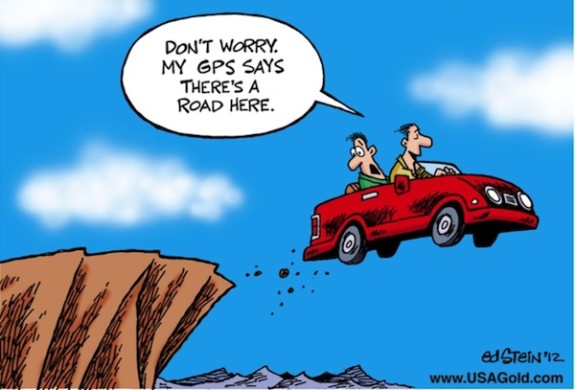GPS is a pretty immersive and prevalent technology and as more and more people begin to explore the incredible capabilities and capacities of this technology, more and more misinformation and misconceptions are being spread.
I think that of all of the technologies of our age, GPS is one of the most widespread. And, as widespread use of GPS is on the rise, so are the rumors, misconceptions and misinformation. While I’m not going to be able to dispel all of these rumors, I wanted to take today and talk about some of the ones that I tend to hear over and over again.
1. The government/Google/everyone is tracking you
This is, without a doubt, the most common misconception about GPS and I can’t even count how many discussions I’ve had on this topic with various friends and family members. Generally, I hear this more in relation to people using their phones for GPS units but I wanted to touch on it anyway.
If you look at how GPS works, then you’ll know that GPS is basically a set of signals that are transmitted to your device, which works as a receiver and translates the information into readable location data. Without going into all of the technical jargon, basically your GPS device is NOT a transmitter in of itself. It is a receiver. It cannot transmit your location to anyone because it doesn’t have those capabilities. Period.
Now smartphones are a little different. They technically do have the capability to transmit location data, and Google does collect it in order to provide services. However, the data Google collects is mostly anonymous and is protected by various privacy policies anyway. It is not shared with the government.
3. If you don’t like the route, just make wrong turns and it’ll find a new route
This is only partially a misconception and depends greatly on your device and your route. Sometimes, if there are multiple ways and you take a wrong turn the GPS will simply say “recalculating” and plot a new route. Most of the time, however, it will simply try and get you to turn around and get back on track. So, if you don’t like the route your best bet is to pull over and manually select a new one or else risk getting lost while your GPS continually recalculates.
3. GPS only works in urban locations
A lot of people tend to be under the impression that GPS doesn’t work when you’re in the boonies and is really only good in cities. Personally, I think that the middle of nowhere is exactly where you ought to be using GPS signals. Besides, in reality you are more likely to have stronger GPS signals in the middle of nowhere than you would in the middle of a city. GPS signals sometimes become distorted or unreliable in the urban jungle, as it bounces around the buildings and is obstructed by other structures.
Granted, some more rural locations may not have super accurate of maps, but these blank spots are becoming more and more uncommon as global mapping expands constantly. So go ahead and fire up that GPS!
4. It’s the GPS’ fault you got lost
This is probably one of the most common statements that I hear, and most of the time it is 100% false. Your GPS is only as good as your maps, and the presence of a GPS doesn’t make up for a lack of common sense. You should always have a backup map with you, and you should pay attention to what you’re doing. Make sure your unit is functioning and up to date before you go anywhere. Chances are your GPS did not get you lost: your common sense did.

